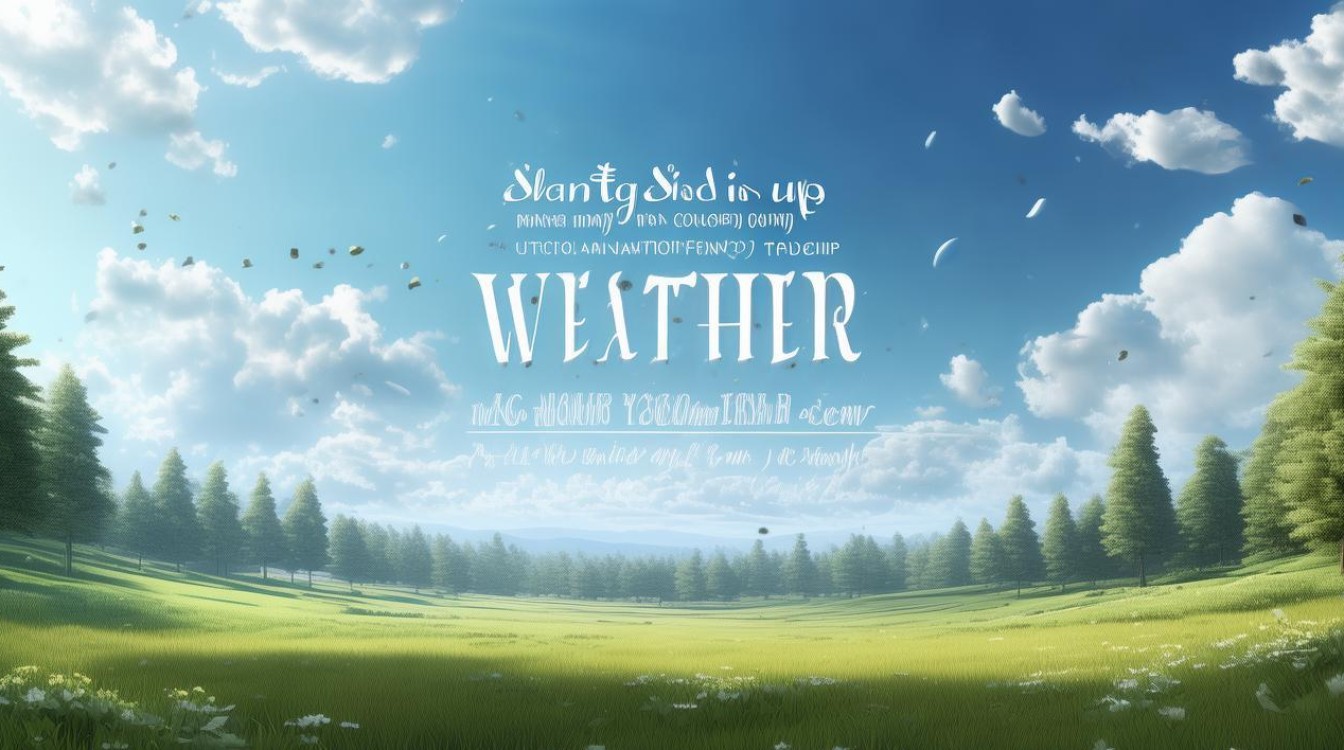天气与人类生活息息相关,许多成语都与天气现象有关,这些成语不仅形象生动,还能帮助人们更好地理解自然与情感的联系,在英语中,同样存在大量与天气相关的表达,掌握这些词汇不仅能提升语言能力,还能让表达更加地道。

与“风”相关的英语成语
A breath of fresh air
字面意思是“一阵新鲜空气”,比喻带来新变化或令人耳目一新的事物。
例句:The new manager was a breath of fresh air for the team.
Throw caution to the wind
意为“不顾一切,冒险行事”,形容做事不计后果。
例句:He decided to throw caution to the wind and quit his job to travel.
Get wind of something
指“听到风声,得知某事”,通常用于非正式场合。
例句:The reporters got wind of the celebrity’s secret wedding.
与“雨”相关的英语成语
It’s raining cats and dogs
形容“倾盆大雨”,是英语中非常经典的表达。
例句:We had to cancel the picnic because it was raining cats and dogs.
Save for a rainy day
意为“未雨绸缪”,指为未来可能遇到的困难做准备。
例句:She always saves part of her salary for a rainy day.
Come rain or shine
表示“无论晴雨,无论如何”,强调坚定不移的态度。
例句:He jogs every morning, come rain or shine.
与“雪”相关的英语成语
Snowed under
指“被大量工作压得喘不过气”,形容忙碌到无法应付。
例句:I can’t go out tonight—I’m completely snowed under with work.

A snowball’s chance in hell
直译是“雪球在地狱里的机会”,比喻某事几乎不可能发生。
例句:He has a snowball’s chance in hell of winning the race against professionals.
Pure as the driven snow
形容“纯洁无瑕”,常用于赞美人的品德。
例句:Despite the rumors, she remains pure as the driven snow.
与“雷”和“闪电”相关的英语成语
A bolt from the blue
指“晴天霹雳”,比喻突如其来的意外事件。
例句:The news of his resignation was a bolt from the blue.
Steal someone’s thunder
意为“抢风头”,指在别人即将成功时抢先行动。
例句:She didn’t mean to steal his thunder by announcing her promotion first.
Lightning never strikes twice in the same place
字面意思是“闪电不会两次击中同一个地方”,比喻罕见的事情不会重复发生。
例句:Don’t worry about another scandal—lightning never strikes twice.
与“云”相关的英语成语
On cloud nine
形容“极度快乐,飘飘然”,相当于中文的“九霄云外”。
例句:After winning the award, she was on cloud nine for days.
Every cloud has a silver lining
意为“黑暗中总有一线光明”,鼓励人们在困境中保持希望。
例句:Losing the job was tough, but every cloud has a silver lining—now he has time to travel.

Head in the clouds
指“不切实际,爱幻想”,形容人脱离现实。
例句:Stop having your head in the clouds and focus on your studies.
与“太阳”相关的英语成语
Make hay while the sun shines
直译是“趁阳光好时晒干草”,比喻“把握时机,趁热打铁”。
例句:The market is booming now, so we should make hay while the sun shines.
Under the sun
意为“世界上的一切”,常用于强调范围广泛。
例句:You can find almost every type of cuisine under the sun in this city.
A place in the sun
指“有利的位置或机会”,比喻成功或舒适的环境。
例句:After years of hard work, he finally found his place in the sun.
与“雾”相关的英语成语
In a fog
形容“困惑,头脑不清醒”,相当于中文的“一头雾水”。
例句:I was in a fog after staying up all night studying.
Foggy memory
指“记忆模糊”,形容记不清细节。
例句:My memory of that event is still foggy.
与“冰”相关的英语成语
Break the ice
意为“打破僵局”,常用于社交场合。
例句:He told a joke to break the ice at the meeting.

On thin ice
指“处境危险,如履薄冰”,形容风险极高。
例句:If you keep missing deadlines, you’ll be on thin ice with the boss.
Skate on thin ice
与“on thin ice”类似,强调冒险行为。
例句:You’re skating on thin ice by ignoring company policies.
与“季节”相关的英语成语
Spring to mind
指“突然想到”,形容灵感闪现。
例句:When I think of summer, beaches and ice cream spring to mind.
Full of the joys of spring
形容“兴高采烈,充满活力”,常用于形容乐观的人。
例句:She’s always full of the joys of spring, no matter what happens.
Winter of discontent
源自莎士比亚,指“不满的冬天”,比喻困难时期。
例句:The economic crisis led to a winter of discontent for many workers.
掌握这些天气相关的英语成语,能让表达更加生动自然,无论是日常交流还是写作,恰当使用这些短语都能提升语言的地道程度。

